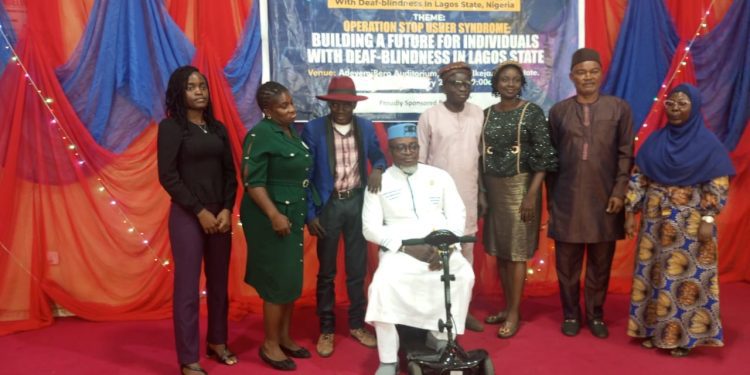Lionheart Ability Leaders International Foundation (LALIF) has demanded the full implementation of the Special Peoples Law (SPL) in Lagos State to ensure the effective inclusion of Persons with Deaf-Blindness, PWDB in all programmes of Government.
Mr. Solomon Okelola, Founder and Executive Director of LALIF, made the demand while speaking at the round table discussion on Usher Syndrome/ Deaf-Blindness with the theme: ‘Operation stop usher syndrome: Building a future for individuals with Deaf-Blindness in Lagos State’.
The roundtable discussion, which aimed to enlighten government officials, CSOs, and the general public about the effect of Deaf-Blindness and Usher syndrome which is the main cause of Deaf-Blindness, was organized by LALIF with support from Disability Rights Fund (DRF).
Mr. Okelola mentioned that this community of Deaf-Blindness deserves to be identified as a disability cluster because Lagos State has a total of 37 Persons with Deaf-Blindness and they should be recognized as equal citizens in the society.
Okelola advised PWDBs themselves to learn to overcome the challenges of Deaf-Blindness and show society that they have something to offer society.
He said “people think we don’t have anything to give. It’s we, who have to show them that we really have something to give, in that way we are motivated to contribute to society.”
During his speech, Mr. Dare Dairo, the General Manager of the Lagos State Office for Disability Affairs (LASODA), commended LALIF for raising awareness about the community and assured that LASODA welcomes every form of solution-driven advocacy that the organization might be proposing.
“When you come up with solutions, we can incorporate the community into our annual budget to ensure that the necessary things are done.
“We are ready, we have people who are passionate about their job to do what is needful,” the General Manager added.
Mr. Dairo buttressed that “today, Lagos State is making a lot of investment for social inclusion of PWDs and when there is a will, there is a way and no matter their form of disability, they must not be disfranchised from getting the best possible advantage and opportunity from those investments.”
He also appealed to parents who have children with Deaf-Blindness to give them a chance to live, adding that “it is not hopeless, there is a lot of potential that can be achieved.”
Dr. Friday Azanor Ovie, Lecturer at Lagos State University while delivering a presentation titled “the challenges of Deaf-Blindness and its Impacts on the Affected” said PWDBs experience more complications than those with a single hearing or visual impairment.
He stressed that there is a need for increased awareness of the impact of this condition on the overall well-being of those affected and their parents.
For her part, Mrs. Comfort Balogun, a parent of a partially Deaf-Blind boy, suggested that the government should provide special accounts and empowerment for children with Deaf-Blindness as this will aid their parents financially.
“It is important that the government prioritize them in the education budget and also empower them and their parents,” she mentioned
She added that it is difficult for parents to cater to the needs of their children, especially because they have to stay out of jobs to serve as their caregivers.
Stakeholders present are Miss Victory Adesanya representing Dr. Adebukola Adebayo, JONAPWD Lagos State Chairman; Mr. Jibetun Sunday, Lagos SUBEB; Mrs. Ogunnubi representing Ministry of Information and Strategy; Mrs. Busayo Winniran, Representative from Desire Health Inclusive Organization.
Others are; Treasures Uchegbu, Speaking Fingers Network; Mrs. Oyetunji Olufunmilola, Vice Chairman Nigeria Association for Special Education Teachers (NASET) Lagos Chapter; Mr. Onifade Fatai, APC Deaf People representative; James Samuel, Association of Sign Language Interpreters of Nigeria (Lagos Chapter) Chapter.

